

How pH Affects Soil Nutrients - Farm Homestead. Any plant suffering from a deficiency of lime (i.e. growing in a pH group that is too low) will show stunting symptoms and the growing tips of the plant are yellow and deformed while the lower parts of the plant remain unaffected.
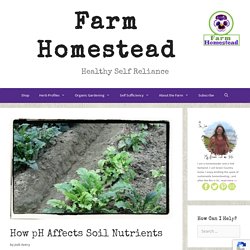
This is often accompanied by short and stubby root growth instead of long fibrous ones. At very low pH levels, aluminum and manganese are dissolved by acids and escape into the soil. These are poisonous to some plants. On the other hand, plants growing in a lime soil (where the pH is too high) can also be adversely affected. This is generally more because of a secondary effect on other plant foods (see later) than because of an excess of Calcium. Symptoms of high pH levels in soil usually show as deficiencies of Iron, Boron, or Manganese. With Iron deficiency, the leaf veins usually remain a deep green.
Boron deficiency shows up as twisted, distorted growth and often the terminal bud dies. The chart shows this quite clearly. Save. Masanobu Fukuoka. Un article de Wikipédia, l'encyclopédie libre.
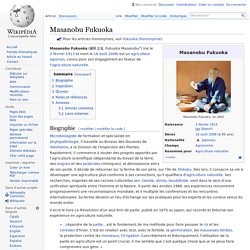
Masanobu Fukuoka, en 2002 Masanobu Fukuoka (福岡 正信, Fukuoka Masanobu?) (né le et mort le ) est un agriculteur japonais, connu pour son engagement en faveur de l'agriculture naturelle. Biographie[modifier | modifier le code] Microbiologiste de formation et spécialiste en phytopathologie, il travaille au Bureau des Douanes de Yokohama, à la Division de l'Inspection des Plantes. Il écrit le livre La Révolution d'un seul brin de paille, publié en 1975 au Japon, qui raconte et théorise son expérience en agriculture naturelle. « ...répandre de la paille... est le fondement de ma méthode pour faire pousser le riz et les céréales d'hiver. . « Faire pousser des arbres sans élagage, sans fertilisant ni pulvérisations chimiques n'est possible que dans un environnement naturel. »
Dichotomous Identification Key: Common Trees of the Pacific Northwest. A dichotomous key is a tool that allows the user to determine the identity of items in the natural world, such as trees, wildflowers, mammals, reptiles, rocks, and fish.
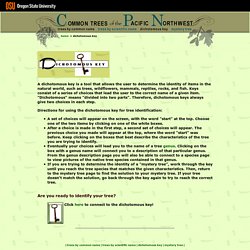
Keys consist of a series of choices that lead the user to the correct name of a given item. "Dichotomous" means "divided into two parts". Therefore, dichotomous keys always give two choices in each step. A set of choices will appear on the screen, with the word "start" at the top. Choose one of the two items by clicking on one of the white boxes. Are you ready to identify your tree? Legumes. BBSRC root traits study highlights cover crop benefits - CHAP. Study Title: Improving Soil Health – Using Roots to Bioengineer Soils Challenge: In order to sustainably increase crop yields to feed the growing world population – and considering the challenges we are facing today due to climate change – we need to carefully manage our soil resources.
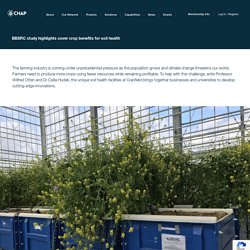
Promoting measures to manage soils better while reducing costs will also help farming businesses remain competitive and profitable. Instead of burning fossil fuels to drag more steel through the ground, this research will harness the power and properties of plant roots to engineer soil for optimised crop growth and improved soil health. Methodology: Cover crops are a way for UK growers to improve soil health by maintaining minimum soil cover, thus minimising the land management required to limit erosion and maintain organic matter levels.
Different cover crops have different root traits, so they bring different benefits to soil. Crop Protection Compendium. Soil Health - applications and opportunities for climate-smart farming, food security and environmental integrity - The CABI Blog. Poor soil fertility is a key constraint to improving farm productivity and farmer livelihoods in sub-Saharan Africa as it is elsewhere in the world.
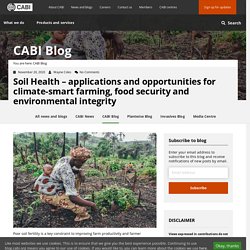
CABI has a long history of helping to improve the livelihoods of smallholder farmers through better access to practical information about integrated soil fertility management as part of the Africa Soil Health Consortium (ASHC) – a project managed by CABI and supported by the Bill and Melinda Gates Foundation. In this blog, originally published in full on CHAP’s website, Neil Douglas Fuller of the Atlas Sustainable Soil Programme looks at soil health as a product of interactions between plant roots and the living fraction of the soil, operating within the constraints of the physical, chemical and climatic parameters of the soil environment.
In part, soil health is determined by the inherent, effectively fixed, properties of underlying geology, topography and landscape processes. Society’s foundation UK strategies Global issue. Invasives: Prevent, Detect, Control - Invasive Species. Home - CABI.org. Fōda. Form.idable. NUTRIRE. AĒR. ENERGEIA. WÆTER. EORTHEN. AEDIFICATIO. BIOS. Forestimidible. Species Specific. Genomics. GUTS FOR GLORY. Plastikos. Ethice. HÆLTH. MEDICA.MEANTS. METIS. ECOLOGIC. New Organica.